Papers by Hannah Swithinbank
THE CONSTRUCTION OF AUTHORITY IN ANCIENT ROME AND BYZANTIUM: THE RHETORIC OF EMPIREby S. TAKÁCS

Reviews S. TAKÁCS, THE CONSTRUCTION OF AUTHORITY IN ANCIENT ROME AND BYZANTIUM: THE RHETORIC OF EMPIRE. Cambridge: Cambridge University Press, 2009. Pp. 167. ISBN 978-0-521-87865-4. £40.00
Journal of Roman Studies, 2010
a rightful political conduct, which Pliny marks by naming opponents of Domitian as friends and hi... more a rightful political conduct, which Pliny marks by naming opponents of Domitian as friends and his supporters as enemies. Gauly’s article includes important discussions on the effectiveness of the text and on the relation between literary constructions, authorship and reception. Thomas Schmitz also studies how text formulates identity. His essay is devoted to Lucian and the complex relationship between power and Bildung in Imperial Greece. Schmitz reads Lucian’s writing as an expression of self in a society where Greek paideia was both powerful, as in possession of cultural capital, and powerless, as in limited access to political command. The dynamic relationship between text and political power forms the central theme in Christel Meier’s contribution. By analysing epic texts, she is able to lay bare central medieval poetic discourses on rule: the panegyric, the exhortative, the utopian, and the critical. Meier emphasizes the independent position of literature, by stressing its precedence of interpretation in describing, refl ecting and commenting on the ruler. Bernhard Teuber draws our attention to the fi eld of drama. He explores the tragedies of Seneca, Calderón, Corneille and Racine, and proposes that they all present different relations between sovereignty, drama and ethical subject. A major point in this very learned analysis is that seventeenth-century theatre continues to interact with Seneca’s plays in a staged discussion of the contemporary ruler. The essays presented in Machtfragen are all of high quality. Some are rather demanding, and with this huge and multi-faceted topic spanning such a long period, few will probably read the book from cover to cover. Many scholars are, however, bound to fi nd articles of signifi cant interest to their own fi elds in the volume. This goes especially for literary studies. In fact, one could argue that there is a certain imbalance in the book, with the introduction and the vast majority of essays dealing with the power of the text. Considering the inclusion of a few pieces on images, ritual and drama, I missed a discussion on how all these variant types of representation differed and were similar in refl ecting and constructing power. That said, the editors should be acknowledged for having produced an in-depth collection that provides valuable insights into a complex and powerful fi eld.
A. B. Gallia, REMEMBERING THE ROMAN REPUBLIC: CULTURE, POLITICS AND HISTORY UNDER THE PRINCIPATE. Cambridge: Cambridge University Press, 2012. Pp. xiv +319, illus. isbn 9781107012608. £60.00
Journal of Roman Studies, 2013

Rhetoric in Rome (J.) Connolly The State of Speech. Rhetoric and Political Thought in Ancient Rome. Pp. xvi + 304. Princeton and Oxford: Princeton University Press, 2007. Cased, £26.95, US$45. ISBN: 978-0-691-12364-6
The Classical Review, 2009
they stood in a work of Theophrastus which is now lost, while unlikely to mislead the specialist,... more they stood in a work of Theophrastus which is now lost, while unlikely to mislead the specialist, could well seriously confuse the undergraduate. For the comments on Posidonius on pp. 27–9 F. does give the appropriate reference (Diod. 37.1.5–22 and 37.3.1, 5). The specialist does not need to have this explained; but the undergraduate, and probably most graduate students, need to know that in Book 37 Diodorus was excerpting Posidonius, and they will appreciate the reference to J. Malitz, Die Historien des Poseidonios (Munich, 1983), pp. 34–42, for the latest full statement of the case. Again the question raises itself: for whom is F. writing? Given the number of textbook banalities in the Introduction, one would think the beginner, but precisely the beginner needs more help in μnding the primary sources; and even the specialist might appreciate the direct reference to, for example, the relevant fragment(s) of Duris of Samos (whose approval of Peripatetic views F. discusses on p. 15) rather than having to turn through the pages of Jacoby to μnd them. Some of F.’s generalisations are misleading. He tells us that Thucydides (unlike Sallust) never blurred or distorted the chronological order of events for rhetorical or argumentative purposes (p. 21); or that Thucydides never openly stated when he approved of a statesman’s or a general’s views (p. 17). Yet Badian’s work on Thucydides (see especially the μrst and third essays in the collection From Plataea to Potidaea) has repeatedly shown of what distortions Thucydides is capable when they suit his purposes; and at 2.65 Thucydides openly praises and approves of Pericles, both the man and his policies. Finally, the lack of editing both amongst the notes themselves and between the Introduction and the notes impinges on the book’s helpfulness. For example, n. 22 merely repeats information from n. 13: a simple cross-reference would have su ̧ced at n. 22. N. 29 merely observes that at 29.2 Sallust committed an error of fact in dating the senatus consultum ultimum. F. gives no discussion of how or why Sallust might have made the error. In the Introduction, however, on p. 21, we μnd such discussion: n. 29 needed a cross-reference. None of this alters the fact that F. has provided much that is useful and helpful. The occasional beginner may μnd just the right level of help in this or that note; and the specialist will be well advised always to consult F.’s notes and introduction to see if F. might have commented helpfully on a given point. Because F.’s notes are neither exhaustive nor uniform, however, neither beginner nor specialist will ever use them as the μrst port of call.
Sustained by Faith? The Role of Christian Belief and Practice in Living Sustainably
Sustainability and the Humanities
This chapter examines Christian beliefs and practices that shape and support sustainable ways of ... more This chapter examines Christian beliefs and practices that shape and support sustainable ways of living and their role in catalysing social movements on environmental issues. In particular, it examines Christian theology that promotes an attentiveness to sustaining the environment and describes how theological reflection can be used alongside practice within international development to foster grassroots social movements related to sustainable development.
Looking at the World in the Light of Jubilee
Transformation: An International Journal of Holistic Mission Studies, 2019
This article provides an introduction to the topic of reflection in this special issue – jubilee ... more This article provides an introduction to the topic of reflection in this special issue – jubilee – and to the value of thinking theologically about the ways in which jubilee illuminates and provides Christian responses to the poverty and inequalities being faced by churches around the world. It also provides an introduction to the articles included in this special issue, which is edited by Tearfund in honour of its 50th anniversary.
Poverty in the Early Church and Today, 2019
Poverty is holistic: it is not just economic or physical but is also social, environmental and sp... more Poverty is holistic: it is not just economic or physical but is also social, environmental and spiritual. It is complex and multi-faceted. Th e root cause of poverty is broken relationships which entered the world as a result of humanity's rebellion against God. At this time, we moved from a life of wholeness, living in perfect relationship with God, creation, ourselves and each other, into a life of broken relationships, broken off from God, family and community, broken off from others further removed from us (diff erent communities, cultures or countries)-and even from ourselves, as a result of false images of identity and self-worth. 2 In this, too, poverty is a lack , with the spiritual aspect of this lack clearly and specifi cally identifi ed as the fundamental loss of relationship with a loving Creator God.

Poverty is one of the most signifi cant challenges our world today faces, and it is a particular ... more Poverty is one of the most signifi cant challenges our world today faces, and it is a particular challenge for Christians, who follow the Jesus who urges giving to the poor and who includes people in poverty among his highest concerns. Th e essays in this book off er a fresh angle on debates about poverty by bringing together people who have expertise and experience in alleviating poverty today with people who have expertise in the ancient worlds of the Bible. We bring them together in order to have a conversation about how Christians today might think about and act on poverty issues, informed by the way our ancestors-in-faith responded to poverty in their places and times. We are not simply interested in holding up modern practices to a supposed early Christian example. Rather, we are interested in the complex ways in which the early Christian ideas and practices relate to modern ideas and practices and vice versa. In other words, the conversation in this book aims to address both continuities and discontinuities between the ancient world and today. We are most interested in coming to grips with the full complexity of the matter, in order to inform and engage our readers, whom we hope will include church leaders, people working in nongovernmental organizations (NGOs) concerned with poverty and thoughtful people, both Christian and not. We designed the book in order to be most benefi cial to individuals and organizations currently involved in addressing poverty in its many forms, as a space for critical thought and discussion. Th erefore, we ground our thinking in a rigorous study of poverty and its alleviation in both earliest Christianity and today's world, while presenting the fruit of this study accessibly for those who do not have formal training in these areas. In this light, the heart of the conversation consists of eight sections. Our book opens with two forewords, which are themselves thoughtful refl ections on poverty, by Graham Tomlin, the Anglican Bishop of Kensington (London), and Cardinal Vincent Nichols, the Catholic Archbishop of Westminster. Justin Th acker then refl ects on the ways we identify poverty and off ers a valuable theological assessment. Th e body of the book is a series of sets of four essays, in which we pair an expert in early Christianity in its Jewish and Graeco-Roman settings with an expert in modern strategies for addressing poverty and benefaction. Th ey each address the same topic from their respective areas of expertise in a substantial essay, and then each author responds to their partner much more briefl y, identifying points which are mutually informing and stimulating. In this way, we hope we shall both model and encourage profi table conversation between those primarily engaged in today's world and specialists in the biblical world. iii or mental and psychological poverty. It also showed me that while Christians (and others) speak of 'the poor' , that, too, is a blunt category. Th ere might be a great deal of discussion around how to deal with poverty and how to help 'the poor'; but in the end, the poor are people , each with their own story, their own reasons for being economically disadvantaged, some of which are told in this volume, all having to deal with the debilitating and demoralizing eff ects of poverty in their own way. A friend who works in disadvantaged areas of the United Kingdom once said to me that the problem is not so much that the rich do not help the poor, as they do not know the poor. A book on attitudes to poverty in the ancient and modern worlds is an excellent contribution to the complex set of issues surrounding poverty; yet my hope is that this book will not just provide intellectual stimulation but will also lead to a desire in those who read it not just to understand poverty but also to experience it, even if vicariously. On my day at the homeless centre, the other people present were the volunteers, people who give time and energy to serve their guests, wash their feet, give legal or housing advice, cook breakfast, listen to their stories. Each one of us had our own problems and issues as well. None of us are self-suffi cient and were never meant to be. We are all, whatever our economic circumstances, in need of a Saviour, someone who understands our story with its highlights and failures, who, 'though he was rich, yet for your sakes he became poor, so that by his poverty you might become rich' (2 Cor. 8.9). Th at Saviour ministers to us through each other, through the words of life, encouragement and gospel we off er one another and through the gestures of love -a meal given, a new set of clothes given, a hand shaken -all bringing the possibility of change. Th is transformation comes not just through remote donations, standing orders or cheques signed, however valuable they may be, but also through human contact, face to face, in which the incarnate Christ makes himself present in that interaction, both for the giver and the receiver, both as recipients of grace. Each word or act of love off ered in the name of Christ becomes a word or act done to Christ and for Christ, as we work out our salvation with fear and trembling. At the end of the day, people experiencing poverty of whatever kind need dignity, not dependence. Th ey need to be treated as precious human beings, created and loved by God as they are, and dignity comes through human contact, not just through handouts. Only then will they fi nd the dignity that enables them to take the hand that helps them out of poverty into self-respect and the ability to make their own contribution to the society in which they live. If this book helps its readers not just to understand poverty but also to get to know one or two people for whom poverty is their daily experience, then it will have done its job well. Graham Tomlin, Bishop of Kensington i Th e Church has, from its beginning, been committed, in the name of Christ, to care for those in poverty. Th is book contributes to that commitment by bringing together present-day thinkers and activists with scholars of Scripture to refl ect on this important theme. I welcome this book. Catholics believe that faith must be put into action. Th e shape of this faith-in-action has been developed and brought together as Catholic Social Teaching, which identifi es and expounds key themes, concerns and practices arising from our faith. 1 Th e dignity of human beings made in God's image and remade in the image of Christ by the Holy Spirit is a core principle in such thinking and action. Further, human existence is not meant to be individualistic, but personal, corporate and communal. Refl ection in this book clarifi es the working out of this principle and the way commitment to human dignity, and community, can transform people caught in poverty by empowering them to respond to its challenges. Pope St John Paul II writes of Jesus: . . . who, while being God , became like us in all things, devoted most of the years of his life on earth to manual work at the carpenter's bench. Th is circumstance constitutes in itself the most eloquent 'Gospel of work' , showing that the basis for determining the value of human work is not primarily the kind of work being done but the fact that the one who is doing it is a person. 2 Catholics and other Christians, thus, have the highest possible motivation to enable people in poverty to move out of dependence into interdependence and community, for in this they follow in the path of our Lord and Saviour Jesus Christ. As Pope Francis has written, Our faith in Christ, who became poor, and was always close to the poor and the outcast, is the basis of our concern for the integral development of society's most neglected members. 3 1 See, e.g., the Catholic Social Teaching website ( , accessed March 2018). 2 Laborem Exercens (On Human Work) §6 (italics original) (paul-ii/en/encyclicals/documents/hf_jp-ii_enc_14091981_laborem-exercens.html, accessed March 2018). 3 Evangelii Gaudium (Th e Joy of the Gospel) §186 ( apost_exhortations/documents/papa-francesco esortazione-ap_20131124_evangelii-gaudium. html#II.%E2%80%82Th e_inclusion_of_the poor_in_society , accessed March 2018).
Introduction:: Seeing Poverty through the Lens of Jubilee
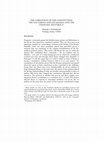
Pompeius' commands against the Mediterranean pirates and Mithridates in the 60s BC have long ... more Pompeius' commands against the Mediterranean pirates and Mithridates in the 60s BC have long been considered together. They are often seen as an important, possibly an 'extraordinary' moment in the decline of the Roman Republic, when one man's popularity gained him unrivalled power, a moment that was important in the ongoing destabilisation of the Republican political system. This article will discuss the way in which the statutes that established these commands - the lex Gabinia and lex Manilia - were part of a long-running process by which the constitution evolved over time and through which Rome changed from Republic to Principate. It will also argue that it is valid to think in terms of Rome as having a constitution, without having to refer to it in 'scare quotes'. An examination of the statutes shows that the Romans interpreted and argued about the nature of their constitution as they responded to the challenges facing their city. These laws were, fundam...
Poverty in the Early Church and Today
ROBB, BEYOND POPULARES AND OPTIMATES: POLITICAL LANGUAGE IN THE LATE REPUBLIC (Historia Einzelschriften 213). Stuttgart: Franz Steiner Verlag, 2010. Pp. 225. isbn 9783515096430. €56.00
Journal of Roman Studies, 2012
Jubilee: God's Answer to Poverty, 2020
In this chapter I want to explore how we are formed, as Christians, to be people who pursue jubil... more In this chapter I want to explore how we are formed, as Christians, to be people who pursue jubilee in the world in which we live: inside the church, but also outside it. What do the principles and aims of jubilee; its pursuit of justice through actions that enable redemption and restoration, liberation and renewal; mean for our own, individual, lives? Our faith is also expressed in our lives beyond our work. We make choices every day, and if we question them closely, we can see that they each reveal something of our understanding of the world and our desires for it in every area of our lives — as well as of the complexity of living as one of God’s people in a broken world.
Sustainability and the Humanities, 2018
This paper examines the way that the Christian faith includes beliefs and practices that shape an... more This paper examines the way that the Christian faith includes beliefs and practices that shape and support sustainable ways of life. In particular it examines the Christian theology that promotes an attentiveness to sustaining the environment and describe the ways that engaging belief alongside practice within development work has a positive and sustained impact upon sustainable development.
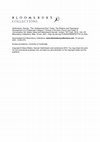
Poverty in the Early Church and Today , 2019
This paper will examine the concept of the ‘undeserving poor’ as it appears in current political ... more This paper will examine the concept of the ‘undeserving poor’ as it appears in current political discourse, looking at the ideas associated with it and the ways in which they are expressed. In order to provide focus to a large topic, the paper will focus on the ongoing debate and coverage of the current Welfare Reform and Work Bill in parliament and the media. In the paper I will argue that in its current use, the concept traps people between an understanding of systemic issues that contribute to poverty and a belief in the potential of an individual to lift themselves of poverty in a way that encourages us to create a category of person who does not truly deserve our support. I will then argue that the Bible provides us with an alternate understanding of poverty in which both individual and systemic factors play a contributing factor and can be tackled by a society, and suggest that this perspective is one to which the church could constructively give a public voice in our contemporary conversations about helping people out of poverty.
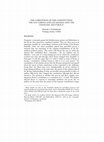
CORRUPTION AND INTEGRITY IN ANCIENT GREECE AND ROME Acta Classica Supplementum IV, 2012
This paper considers the evolution of the Roman constitution and what the ideas of ‘integrity’ an... more This paper considers the evolution of the Roman constitution and what the ideas of ‘integrity’ and ‘corruption’ might mean in relation to it. It argues that Rome’s constitution, though uncodified, was constructed and developed through arguments about and interpretations of constitutional action in Republican politics. The paper will situate the lex Gabinia and lex Manilia within this process, examining the interpretations of the constitution that were put forward for and against them. It will show that these statutes put forward a particular, populist interpretation of the Roman constitution that contributed to the development of the constitution in the first century and argue that the way they were passed made them an integral part of Rome’s constitutional evolution. However, it will also argue that these statutes had a negative impact on the Roman constitution, destabilising and corrupting the Republican political system.
Thesis Chapters by Hannah Swithinbank
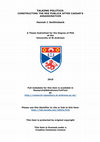
Doctoral Thesis , 2010
The nature of the Republican constitution has been much contested by scholars studying the histor... more The nature of the Republican constitution has been much contested by scholars studying the history of the Roman Republic. In considering the problems of the late Republic, the nature of the constitution is an important question, for if we do not understand what the constitution was, how can we explain Rome’s transition from ‘Republic’ to ‘Empire’? Such a question is particularly pertinent when looking at events at Rome following the assassination of Caesar, as we try to understand why it was that the Republic, as we understand it as a polity without a sole ruler, was not restored.
This thesis examines the Roman understanding of the constitution in the aftermath of Caesar’s death and argues that for the Romans the constitution was a contested entity, its proper nature debated and fought over, and that this contest led to conflict on the political stage, becoming a key factor in the failure to restore the Republic and the establishment of the Second Triumvirate. The thesis proposes a new methodology for the examination of the constitution, employing modern critical theories of discourse and the formation of knowledge to establish and analyse the Roman constitution as a discursive entity: interpreted, contested and established through discourse. I argue that the Roman knowledge of the proper nature of the constitution of the res publica had fractured by the time of Caesar’s death and that this fracturing led to multiple understandings of the constitution. In this thesis I describe the state of Rome in 44-43 B.C. to reveal these multiple understandings of the constitution, and undertake an analysis of the discourse of Cicero and Sallust after 44 B.C. in order to describe the way in which different understandings of the constitution were formulated and expressed. Through this examination this thesis shows that the expression and interrelation of these multiple understandings in Roman political discourse made arrival at a unified agreement on a common course of action all but impossible and that this combined with the volatile atmosphere at Rome after Caesar’s death played a major role in Rome’s slide towards civil war and the eventual establishment of a different political system.









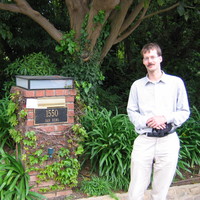

Uploads
Papers by Hannah Swithinbank
Thesis Chapters by Hannah Swithinbank
This thesis examines the Roman understanding of the constitution in the aftermath of Caesar’s death and argues that for the Romans the constitution was a contested entity, its proper nature debated and fought over, and that this contest led to conflict on the political stage, becoming a key factor in the failure to restore the Republic and the establishment of the Second Triumvirate. The thesis proposes a new methodology for the examination of the constitution, employing modern critical theories of discourse and the formation of knowledge to establish and analyse the Roman constitution as a discursive entity: interpreted, contested and established through discourse. I argue that the Roman knowledge of the proper nature of the constitution of the res publica had fractured by the time of Caesar’s death and that this fracturing led to multiple understandings of the constitution. In this thesis I describe the state of Rome in 44-43 B.C. to reveal these multiple understandings of the constitution, and undertake an analysis of the discourse of Cicero and Sallust after 44 B.C. in order to describe the way in which different understandings of the constitution were formulated and expressed. Through this examination this thesis shows that the expression and interrelation of these multiple understandings in Roman political discourse made arrival at a unified agreement on a common course of action all but impossible and that this combined with the volatile atmosphere at Rome after Caesar’s death played a major role in Rome’s slide towards civil war and the eventual establishment of a different political system.
This thesis examines the Roman understanding of the constitution in the aftermath of Caesar’s death and argues that for the Romans the constitution was a contested entity, its proper nature debated and fought over, and that this contest led to conflict on the political stage, becoming a key factor in the failure to restore the Republic and the establishment of the Second Triumvirate. The thesis proposes a new methodology for the examination of the constitution, employing modern critical theories of discourse and the formation of knowledge to establish and analyse the Roman constitution as a discursive entity: interpreted, contested and established through discourse. I argue that the Roman knowledge of the proper nature of the constitution of the res publica had fractured by the time of Caesar’s death and that this fracturing led to multiple understandings of the constitution. In this thesis I describe the state of Rome in 44-43 B.C. to reveal these multiple understandings of the constitution, and undertake an analysis of the discourse of Cicero and Sallust after 44 B.C. in order to describe the way in which different understandings of the constitution were formulated and expressed. Through this examination this thesis shows that the expression and interrelation of these multiple understandings in Roman political discourse made arrival at a unified agreement on a common course of action all but impossible and that this combined with the volatile atmosphere at Rome after Caesar’s death played a major role in Rome’s slide towards civil war and the eventual establishment of a different political system.
In this light, the book covers seven major areas of poverty and its causes, benefaction, patronage, donation, wealth and dehumanization, ‘the undeserving poor’, and responsibility. Each area features an expert in early Christianity in its Jewish and Graeco-Roman settings, paired with an expert in modern strategies for addressing poverty and benefaction; each author engages with the same topic from their respective area of expertise, and responds to their partner’s essay. Giving careful attention toboth the continuities and discontinuities between the ancient world and today, the contributors seek to inform and engage church leaders, those working in NGOs concerned with poverty, and all interested in these crucial issues, both Christian and not.